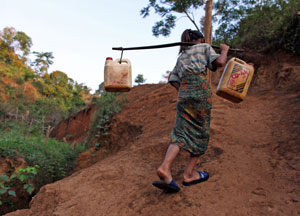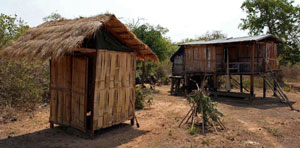Prime Minister Julia Gillard today announced that Australia will provide more funding to help millions of people in developing countries access clean water and sanitation.
For people in developing countries, the simple act of hand-washing can mean the difference between life and death. Pneumonia, trachoma, scabies, skin and eye infections, diarrhoea: the risks posed by these diseases are dramatically reduced by a person lathering their hands with soap before preparing food, having a meal or after using the toilet.
Having access to safe water and basic sanitation is vital to everyone's life. The negative impacts on the health and quality of life of people who do not have such access are huge. This is particularly the case for poor and vulnerable people.
But for many people throughout Asia, Africa and the Pacific, access to clean water and sanitation facilities–not to mention an understanding of good hygiene practices–is often non-existent. Instead, water-related illnesses take the lives of 6,000 people each day.
Australia's Civil Society, Water Sanitation and Hygiene Fund shows Australia's commitment to reversing those numbers. The $97 million in funding will support around 40 water, sanitation and hygiene initiatives in 20 countries, teaming up AusAID and non-government organisations with proven records in this area. It is expected that over the next four years 1.8 million more people will have access to safe water and basic sanitation combined with improved hygiene behaviour.
The new funding builds on the original $32.6 million program, which was completed in March 2012. Its many successes included delivering access to safe water for more than 560,000 people and helping 780,000 people gain basic sanitation in Bangladesh, Kenya, Mozambique and Vietnam, among others.
Building latrines for women in Laos
For many women in the developing world the only time they have to defecate is after dark. With no access to private latrines and daylight hours spent fetching water and managing households, women must arm themselves with sticks and journey into the forest. Once there, they are often harassed or attacked.
CARE Australia [external website), an international aid organisation fighting global poverty with a special focus on working with women and girls, has been working to overcome gender bias in access to sanitation in the Sekong Province in Laos.
'At first we had difficulties marketing latrines because usually in the community meetings only men would speak,' said Raymundo Rodriguez, a water and sanitation advisor in Laos.
'They thought they didn't need latrines because they could easily go to the river, or go to the forest. But for women, it's different. We talked to them in a separate women's group, bringing together women, the government and CARE staff.'
It was in these groups that women had the confidence to tell male leaders about the need for latrines. They spoke of their fear of going into the forest and concerns about privacy. A latrine, they said, means convenience. A latrine equals good health.
'This group was able to present their needs to the bigger community group and the men agreed to support construction of latrines,' said Rodriguez.
More information
Civil Society, Water Sanitation and Hygiene Fund
Media release: Better access to food and water for world's poor
Water and sanitation in the Australian aid program
Civil Society WASH Learning Fund [external website]


